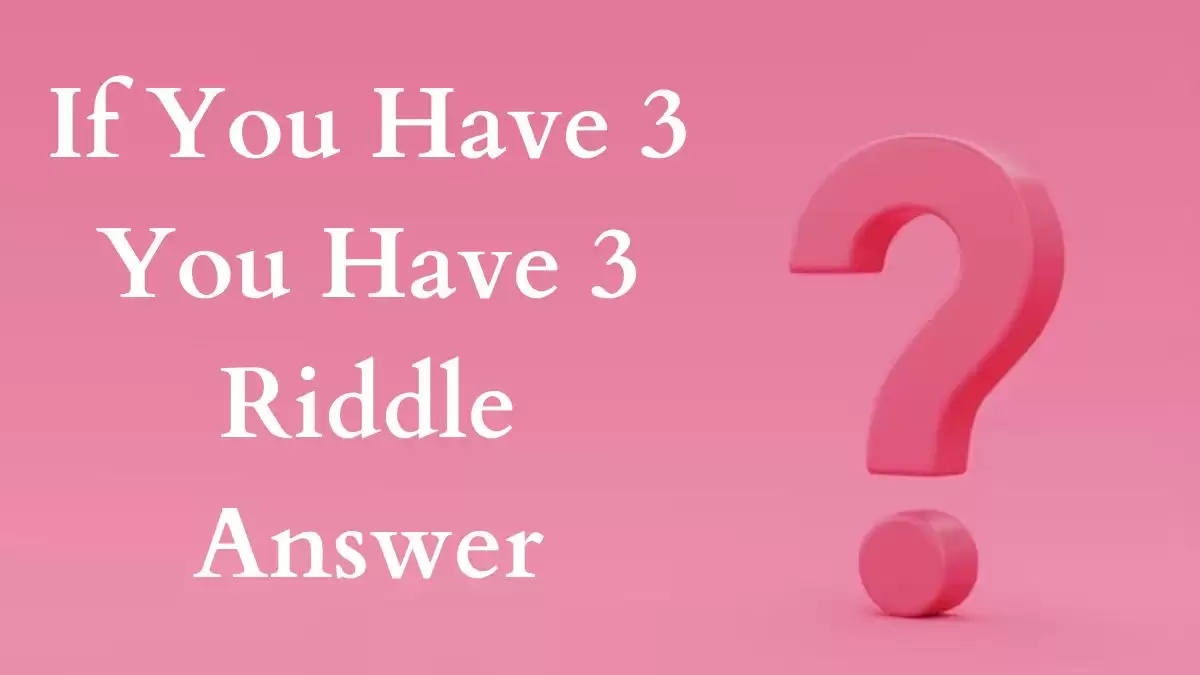If You Have 3 You Have 3 Riddle Answer Solved and Explained
by Mathelene
Updated Nov 07, 2023

If You Have 3 You Have 3 Riddle
Riddle:
If you have 3, you have 3.
If you have 2, you have 2.
But if you have 1, you have 0.
What am I?
This riddle plays with a clever twist on numbers and expectations. It challenges our understanding of quantity and the relationship between numbers and their representations. It highlights that the value of a number is not always straightforward and can change based on context.
The riddle suggests that when you have three of something, you indeed have three, which is an obvious and expected outcome. Likewise, when you possess two, you have two, a logical and consistent statement. However, the riddle takes an intriguing turn when it declares that having one results in having none.
This shift in perception encourages us to think beyond the surface level and consider how numbers can be more than just their numerical value. It invites us to contemplate the interplay between mathematics, language, and abstract thinking, ultimately challenging us to uncover the hidden meaning behind this intriguing riddle.
The riddle collection spans from classic brainteasers to cryptic enigmas, offering a diverse range of challenges that cater to all puzzle enthusiasts. Find all these amazing puzzles at Fresherslive.
If You Have 3 You Have 3 Riddle Answer
The Answer to the Riddle is: Choice
Explanation:
In this riddle, the word "choice" is used with multiple meanings to create a clever twist. When you have three choices, it means you have three different options to choose from. Having two choices means you have two options to pick from. However, when you're left with only one choice, the riddle means you actually have no choice at all. This can be confusing because "choice" can refer to both the options you can choose from and the act of making a decision.
So, the riddle challenges us to think beyond the surface meaning of the word "choice" and consider it in the context of decision-making. When you're down to just one option, there's no decision to make; the choice is already made for you. The riddle plays with this linguistic ambiguity to create a surprising twist, and now that you understand it, you can impress others by solving it!
What is Riddle?
Get ready for an exciting journey into the world of riddles! Riddles are like puzzles that use clever words and tricky meanings to challenge our thinking. They have been enjoyed for a very long time, and they make our brains work hard. Imagine a place where riddles are like kings. They twist and turn with tricky words, making us scratch our heads. Some riddles are very old, passed down for generations, while others are brand new and designed to make us think.
As we go on this riddle adventure, get ready to use your imagination and brainpower. Riddles are not just simple questions. They make us think hard and find smart answers. Each time you solve a riddle, it's like a big win, showing how clever you are. Even when a riddle is too tough to crack, it leaves us wondering and wanting to learn more. So, let's enjoy riddles together. They will make you curious, imaginative, and smarter. We'll uncover your brilliance one riddle at a time and have fun along the way!
Advantages Of Solving Riddles
Thinking Skills: Riddles make you think hard, improving your ability to solve tricky problems and come up with creative ideas.
Problem Solving: They challenge you to find unique solutions, teaching you to look at things from different angles and solve complex issues.
Language Skills: Riddles are like word puzzles. They help you learn new words and understand how language works, making you better at talking and writing.
Creativity: Riddles encourage you to think outside the box, which means thinking in new and creative ways. This skill can be useful in many areas of life.
Mental Exercise: Solving riddles is like a workout for your brain. It keeps your mind active, improves your memory, and helps you focus better.
If You Have 3 You Have 3 Riddle Answer - FAQs
The riddle challenges our understanding of numbers and the word "choice." It highlights that having three choices means you have three options to choose from.
The riddle uses the word "choice" with a dual meaning. When you have only one choice, it means the decision is already made for you, so you don't have a choice to make.
The riddle intentionally plays with the multiple meanings of the word "choice" to create confusion and a surprising twist in the interpretation.
This riddle challenges our perception of numbers and language, encouraging us to think abstractly and consider how context can alter the meaning of words.
You can share this riddle with friends and explain the clever play on words. When they grasp the hidden meaning, you can amaze them with your insights.







